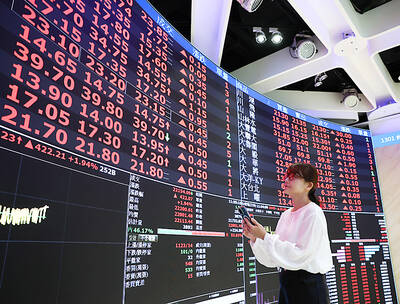UBS Group AG is to permanently allow as many as two-thirds of its employees to adopt a hybrid model of working from home and the office, a person familiar with the plans has said, as it seeks a competitive recruitment edge over some US banks taking a more hardline approach.
The lender’s move is being led by chief executive officer Ralph Hamers, the person said, asking not to be identified because the information is not public.
The bank is also committed to offering staff the flexibility of a hybrid work arrangement based on roles and locations, the person said.

Photo: Reuters
The bank’s internal analysis shows that two-thirds of its employees are in positions suitable for hybrid working, while other roles, such as traders and branch staff, would need to work on site, the person said.
No date for a return to the office has been set, the person said.
An official at UBS declined to comment on the plans, which were first reported by the Financial Times.
UBS chairman Axel Weber and former chief executive officer Sergio Ermotti had at the start of the year hinted that a flexible working model was under consideration and that at least one-third of UBS’ workforce could work permanently from home.
The move by UBS is in stark contrast with many of its US rivals. Goldman Sachs Group Inc has required almost all of its US employees to report to their desks, JPMorgan Chase & Co is asking most of its US workers to start regular office schedules on Tuesday next week and Morgan Stanley chief executive officer James Gorman fired off a warning shot: “If you can go to a restaurant in New York City, you can come into the office and we want you in the office.”
Citigroup Inc has also told most workers that they can adopt a hybrid schedule between home and the office longer term.
Deutsche Bank AG told US investment bankers that it expects them back in the company’s offices by early September, although the company has said that it is working on plans to allow staff to work from home up to three days per week.
Dealing with a global workforce also poses the challenge of a more universal corporate policy, with new waves of the COVID-19 pandemic prompting lockdowns and other restrictions around the world.
For some banks, the moves have meant re-evaluating their footprint and use of office space.
UBS last year started a review of its real-estate properties, echoing comments from Deutsche Bank that desk sharing would be accelerated as more people stayed home at least part of the time.

UNCERTAINTIES: Exports surged 34.1% and private investment grew 7.03% to outpace expectations in the first half, although US tariffs could stall momentum The Chung-Hua Institution for Economic Research (CIER, 中華經濟研究院) yesterday raised its GDP growth forecast to 3.05 percent this year on a robust first-half performance, but warned that US tariff threats and external uncertainty could stall momentum in the second half of the year. “The first half proved exceptionally strong, allowing room for optimism,” CIER president Lien Hsien-ming (連賢明) said. “But the growth momentum may slow moving forward due to US tariffs.” The tariff threat poses definite downside risks, although the scale of the impact remains unclear given the unpredictability of US President Donald Trump’s policies, Lien said. Despite the headwinds, Taiwan is likely

READY TO BUY: Shortly after Nvidia announced the approval, Chinese firms scrambled to order the H20 GPUs, which the company must send to the US government for approval Nvidia Corp chief executive officer Jensen Huang (黃仁勳) late on Monday said the technology giant has won approval from US President Donald Trump’s administration to sell its advanced H20 graphics processing units (GPUs) used to develop artificial intelligence (AI) to China. The news came in a company blog post late on Monday and Huang also spoke about the coup on China’s state-run China Global Television Network in remarks shown on X. “The US government has assured Nvidia that licenses will be granted, and Nvidia hopes to start deliveries soon,” the post said. “Today, I’m announcing that the US government has approved for us

When Lika Megreladze was a child, life in her native western Georgian region of Guria revolved around tea. Her mother worked for decades as a scientist at the Soviet Union’s Institute of Tea and Subtropical Crops in the village of Anaseuli, Georgia, perfecting cultivation methods for a Georgian tea industry that supplied the bulk of the vast communist state’s brews. “When I was a child, this was only my mum’s workplace. Only later I realized that it was something big,” she said. Now, the institute lies abandoned. Yellowed papers are strewn around its decaying corridors, and a statue of Soviet founder Vladimir Lenin

The National Stabilization Fund (NSF, 國安基金) is to continue supporting local shares, as uncertainties in international politics and the economy could affect Taiwanese industries’ global deployment and corporate profits, as well as affect stock movement and investor confidence, the Ministry of Finance said in a statement yesterday. The NT$500 billion (US$17.1 billion) fund would remain active in the stock market as the US’ tariff measures have not yet been fully finalized, which would drive international capital flows and global supply chain restructuring, the ministry said after the a meeting of the fund’s steering committee. Along with ongoing geopolitical risks and an unfavorable